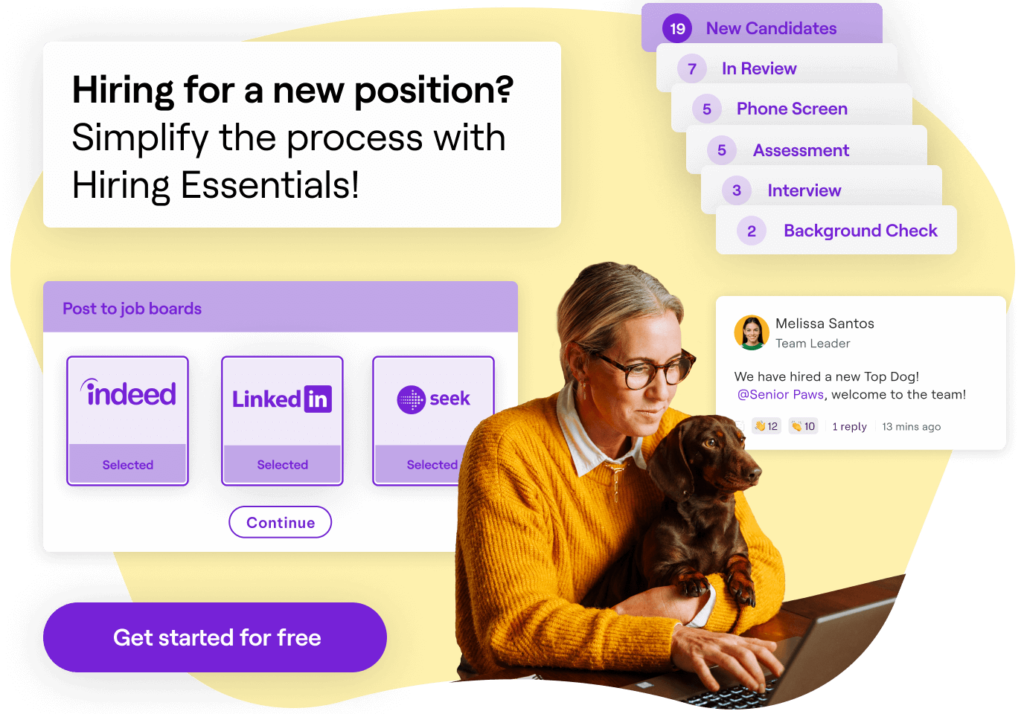
We come today with five potent interview questions designed to help you weed out those pesky, overconfident energy-suckers before they even get to contract. Managing bad hires is part of the job of an HR manager.
That doesn’t mean it isn’t painful – for you as well as for your organisation.
A recent working paper from Harvard Business School showed how toxic workers cost a business an estimated US$25,000 to US$50,000 each. So it pays to avoid recruiting them in the first place.
The trouble is, they can be sneakily tricky to recognise until they’re in the thick of your organisation.
What are the traits of bad hires?
The first step to avoiding bad hires is understanding the traits of bad hires.
These are some of the most common traits:
- Entitlement: A sense of entitlement can make bad hires feel they deserve special treatment. They might act entitled to company resources, break the rules, or take advantage of their co-workers.
- Lack of accountability: Bad hires are often reluctant to take responsibility for their actions. They might make excuses, blame others, or try to cover up their mistakes.
- Poor communication: Bad hires might have trouble communicating their ideas. They might also be bad listeners, which can make it difficult to work with them.
- Resistance to change: Resistance to change is another trait of bad hires. They might be resistant to change, both in their work and in their personal lives.
Pro tip: Look out for these interview red flags when conducting an interview.
Five interview questions to reveal bad hires
Now that you know the common traits of bad candidates, here are five questions you can ask in an interview to help weed out the bad apples:
1. What is one of your biggest failures, and how could you have done better?
No one likes to dwell on their failures, but how someone responds to a disappointment is telling. A typical bad hire, for example, will have a super hard time recognising their own faults yet will be snappy to point the finger of blame at others.
What does this mean for you? In our experience, candidates who can’t accept responsibility for their shortcomings are highly unlikely to accept advice or constructive criticism from their colleagues or managers. They are equally unlikely to recognise and learn from their mistakes (because – remember, they didn’t make any!).
Tellingly, these candidates generally won’t ask for help when needed, and they won’t appreciate their team members who go above and beyond to help them out.
Asking interview questions where interviewees have to describe an experience in which things did not turn out quite as well as they’d hoped and what they did about it gives you insight into how they perform under pressure.
Watch for the red flags when they blame others.
Read more: Be wary of unconscious bias in hiring managers
2. What is your biggest success, and how did you achieve it?
While bad candidates find it hard to shoulder the blame for failures, they are usually super-fast to accept praise. Other signs of a bad hire to watch out for are counting team success as their personal achievements. You can hear them describe success in terms of “I”, not “we”, joyously disregarding any help they received along the way.
These guys are definitely not team players. Anyone who only wants to talk about his or her personal wins in past positions without crediting co-workers is literally flaunting a major ego problem. Sound the alarm bells.
On the flip side, great candidates will always show their passion for doing their best work, the role they played in their team, and the impact the team had on the organisation.
Download our hiring interview checklist to screen candidates systematically
3. What skill do you think you lack the most?
A potentially toxic employee thinks they know it all and aren’t interested in learning new skills. On the other hand, candidates who truly want to grow will easily identify skills they need to acquire and find simple, inexpensive ways of doing so.
Interview questions that reveal a candidate’s more vulnerable side give great insight into their personality.
4. Tell us about your ideal workday
Good relationships are important to team morale and job satisfaction in any work environment. But they aren’t everything. And it’s not a good sign for a candidate to simply focus on the social aspects of their workday and not the actual work.
Look for candidates who think it’s important to form working relationships and get along with others while completing their work.
5. What five things would you change about your current role, and why?
It’s perfectly normal for candidates to dislike parts of their current role, but they should be able to explain the issues without complaining about or blaming any particular person.
Asking for five different things really pushes them to focus on issues, and you may pressure them into revealing signs of bad hires.
So your candidate has navigated unheeded through your fine toxicity filter. Good job! Here are a couple of final tips to be super sure you’ve got a high-performer on the line.
Don’t just rely on interview questions: reference check!
Even when candidates have the perfect replies to these questions and are looking like a strong fit, make sure you actually speak with referees before you offer them the job. Sure, most referees will not say anything unduly negative about a former colleague, but it’s often what they don’t say that matters.
Be specific over your call, and ask some behavioural questions that deliver some between-the-line nuances:
- What’s it like working with him/her?
- How did subordinates feel about working for him/her?
- Is he/she a team player?
- What could he/she improve on?
- What do you consider is their greatest attribute?
Listen very closely and be sure to drill down when you sense trouble. Using behavioural interviewing techniques and understanding how the candidate conducted themselves in the past will help you assess whether there are any potential behavioural flaws to avoid.
Read more: How to conduct employee reference checks
Get the team involved in interview questions
Once you’ve narrowed down your shortlist to just two or three candidates, it’s smart to get the wider team to meet them. While a gifted yet toxic candidate might be able to pull the wool over your eyes, it’s unlikely they can fool the whole team.
Pro tip: Create an internal referral program to get great talent that has been vouched for.
Want more?
Having a team with bad hires can badly affect your company growth and culture. Here are more resources for hiring managers to nail the recruitment process with the help of a recruitment and hiring software:
- Stellar candidate experience checklist
- Why employer branding matters
- How to source the best talents
- Ready-made job description template
- Creating an ideal job advertisement
- How to advertise job openings
- Our complete recruitment guide
Hiring interview checklist
